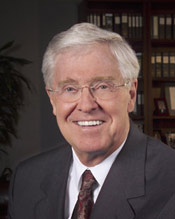Charles Koch applied the "science of liberty" to become one of the world's richest men.
 Opinion Journal has a great article on Charles Koch, a fellow engineer who later discovered the wonders of the free-market and the “science of liberty”. Mr. Koch is CEO of Koch Industries, is the world’s 33rd wealthiest individual, and sits on the board of the Mercatus Center, where I work. From what I understand, Mr. Koch was also very instrumental in Vernon Smith (who won the Nobel Prize in Economics in 2002) coming to George Mason University. According to his profile on the Koch foundation website, he also “helped found a number of organizations, including the Institute for Humane Studies, the Cato Institute, the Mercatus Center and George Mason University, the Bill of Rights Institute, and the Market Based Management Institute.”
Opinion Journal has a great article on Charles Koch, a fellow engineer who later discovered the wonders of the free-market and the “science of liberty”. Mr. Koch is CEO of Koch Industries, is the world’s 33rd wealthiest individual, and sits on the board of the Mercatus Center, where I work. From what I understand, Mr. Koch was also very instrumental in Vernon Smith (who won the Nobel Prize in Economics in 2002) coming to George Mason University. According to his profile on the Koch foundation website, he also “helped found a number of organizations, including the Institute for Humane Studies, the Cato Institute, the Mercatus Center and George Mason University, the Bill of Rights Institute, and the Market Based Management Institute.”Here’s some of what the article had to say:
Hmm… a trained engineer who discovers the joys of free-market economics, has ties to GMU and the Mercatus Center, lots of business experience, and a fan of Hayek! I wonder how long until I hit my first billion???
Meet Charles Koch. Philosopher, engineer, self-trained economist, libertarian activist, philanthropist--and the CEO of Koch Industries, a $60 billion, 80,000-employee empire, which just recently became the largest and most profitable privately held company in America.
But you've probably never heard of it.
Neither Charles Koch nor his firm are household names. Mr. Koch (pronounced "coke") has managed to live in relative obscurity despite being one of the richest men on the planet, with a net worth estimated at $14 billion. He is a man of modesty who craves none of the fame or public adulation that seems to preoccupy other members of the billionaires' club.
Yet celebrity seems to intrude. On the day I visit the company's Kansas headquarters, his office is atwitter over a recent issue of Forbes magazine featuring the world's billionaires. The issue includes a glossy photo of Charles Koch smiling contentedly, and right below him on the page is a picture of a slightly better known titan: Oprah. Running in company like that is bound to bump up Mr. Koch's public profile--whether he likes it or not.
My mission, then, is to unwrap at least a few of the secrets of his success.
Mr. Koch is immersed in the ideas of liberty and free markets. Whereas the bookshelves of most of America's leading CEOs are stocked with pop corporate management and "how to succeed" books, Mr. Koch's office is a wall-to-wall shrine to writings in classical economics, or, as he calls it, "the science of liberty." The authors who have had the most profound influence on his own political philosophy include F.A. Hayek, Ludwig von Mises, Joseph Schumpeter, Julian Simon, Paul Johnson and Charles Murray. Mr. Koch says that he experienced an intellectual epiphany in the early 1960s, when he attended a conference on free-market capitalism hosted by the late, great Leonard Reed.
Mr. Koch is by training a scientist, with master's degrees from MIT in nuclear and chemical engineering. Despite his business success, he has no MBA or formal management training. Mr. Koch sees that as an advantage. "Being an engineer, I realized there's an objective reality that helps one understand the rules and conditions that improve the human condition," he says. "Laws and principles that facilitate the advancement of peace, prosperity and social progress are as immutable as the laws that work in science. . . . Politicians often come up with misguided policy solutions," he continues, "because they suffer from Hayek's 'fatal conceit' and believe they can violate basic laws of economics. They are just as misguided as the man who jumps out the 14th floor of a building convinced that he can repeal the law of gravity."
Charles Koch--no surprise--disdains government and the political class. He has invested tens of millions of dollars into free-market think-tanks and political activist groups (including several founded by this author). He's disgusted with the runaway federal budget under the Republicans, and he proposes that "every new law should be subject to the question: Will it strengthen the culture of prosperity?" Won't about 90% of the laws fail that test? "Yes, that's exactly what I mean," he replies. "But the problem isn't the people in government, it's the system--the incentives are perverse."
For my part, after listening to this natural-born teacher exalt the superiority of free markets and the boundless wealth that they can create, I feel as though I'm about to experience one of Maslow's "peak experiences" myself. But our time is up, and if Mr. Koch has learned nothing else from his spiritual mentors, it's the concept of opportunity cost. Time is money, and it's time to get back to his greatest passion of all: building the profitability of his world-class company.
1 comment:
From what I've been reading of late, I would love to meet Charles Koch. It's not every day you run across someone who believes in and applies practical philosophy.
Post a Comment